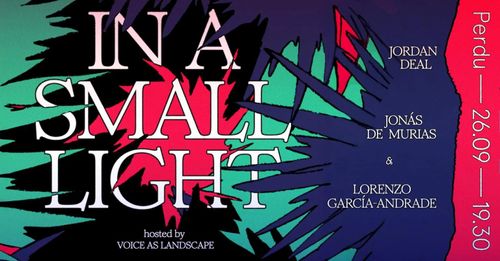In a small light

In a Small Light is the first Avonden of the 2025–26 season at Perdu. It is hosted by Voice as Landscape, an editorial line concerned with the relationship of voicings and territory, and it will introduce a new focus on song and its shifting roles across time. This interest has grown out of ongoing conversations with the different artists and collaborators over the past couple of years.
Last season, Enrico Dau Yang Wey explored the purpose of songs in the past, in their research as an artist-in-residence at Perdu: when they were sung for harvest, labour, welcome and ritual; as ways of marking time and transferring knowledge. Today, songs circulate within very different economies. Music streaming platforms—many embedded in structures of extraction and genocide—regulate attention and consumption through algorithms, while folk music traditions are increasingly co-opted by reactionary agendas and instrumentalised for their narrow political purposes.
This season, Voice as Landscape is concerned with the making and unmaking of song today, and with its enduring potential to generate imaginaries, shape community, and form a sense of self. This inquiry will unfold through a series of Avonden that brings together works transferring different experiences of what song, in its relationship to the poetic, can be and do in the present.
This first Avond presents two offerings—emerging from diverse traditions and expressed in different mediums—that explore how song moves through memory, carries afterlives, and generates models of story.
Visiting from Philadelphia, Jordan Deal will present a genre-defying song-suite that channels shifting personae across a surreal, sonic landscape. The piece draws from their album Seas of Triple Conciousness released by Horns of Plenty (UK). Centred around piano and woven with harmonica, percussion, guitar, and field recordings, the performance traverses the edges of blues and avant-garde, blurring the lines between sound, theatre, and ritual.
Intertwining performance art and poetry, Jordan invokes a soulful defiance while meditating on the ghosts of state violence, the textures of collapse, and the fragile threads of intimacy and collective memory. What emerges is a layered sonic offering—part incantation, part excavation—that combs through spiritual detritus in search of future worlds.
The second offering of the Avond will be by Jonás de Murias and Lorenzo García-Andrade. Jonás was the first artist-in-residence at Perdu in 2023 and, with Lorenzo, will present a formalized outcome of the research and work he and Lorenzo conducted during that time.
Jonás and Lorenzo explore the generative potentials of memory. They weave together reminiscences and threads from the past with emerging constellations of persons, objects, experiences, and stories tied to the places they work with. From these relationships, they create site-specific performances that integrate sound, language, video, song, and text, generating situations in which stories, emotions, and images of the past are rewired in correspondence with the present.
In this way, qualities of memory—such as hieratism, volatility, or starkness—are transformed through the creation of temporary sentimental structures that cross and collapse, opening a space of wonder about the origins of the forces that destroy worlds in order to give way to new ones.
Participants
Jordan Deal is a Philadelphia-based multidisciplinary practitioner and conjurer. Their investigative practice uses performance, sound, film, writing, sculpture, and their body as a conduit between unseen forces, socio-political structures, and anomalies. Through their use of speculative philosophy, punk tonalities, myth, and process-based research, they have developed an artistic/scholarly practice that bleeds into avant-theatrical performances, happenings, and sonic compositions. They utilise vocal and movement-based improvisational techniques to harness and disperse a concept they call chaos force as a subversive material and methodology. Their shapeshifting forms are intended to experiment with embodied black queer futurity–rendering the space between fugitivity, subterranean landscapes, worldbuilding, resistance, and a love poetic.
Jonás de Murias composes sonorities of hypertextual impetus in space. By disfiguring field recordings from different sources and other sound or written material, Jonás assembles sound/linguistic materialities that trace and unravel feelings of belonging, desire or catastrophe. In the form of possible/invented communo-ethnographies, more decentral than national, these spectral compositions take the shape of performances, sound installations or audiovisual pieces that seek to rewire biases that make us discern or relate certain sound materialities with automatic preconceived ideas of origin or class. That is, to disrupt consensual sound regimes by exploring ways in which sonorities in ruins or disuse from the most discardable areas can imagine themselves as futureable.
Lorenzo Llamas was born in Madrid and raised in Havana. He has a background in political science and is currently based in Amsterdam. His work is involved with places, communities, and their interrelations. It takes the form of performances, expanded curatorial settings, gatherings, gardens, (re)situationism, text and films. The projects he develops are committed to the public realm of art and his work often navigates the boundaries between art and broader societal contexts in search of communal luxury, desirable abundances and hypothetical poetics. Lorenzo is an editor at Perdu and with Alec Mateo shares the research area they call Voice as Landscape.